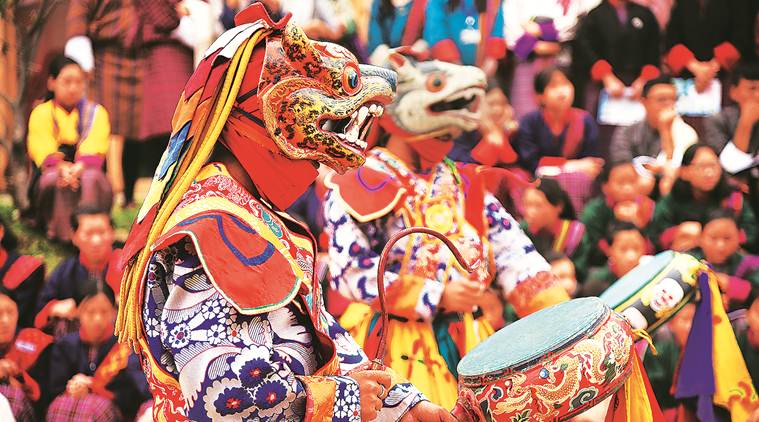
While Prime Minister Modi inaugurated the Mangdechhu hydelpower project in Bhutan as part of his “neighbourhood first” policy this weekend, in another part of the country — in Paro — a pop-up was held as a curtain-raiser to the 10th Mountain Echoes festival of literature, art and culture to be held in Thimpu from August 23-25.
The day-long Paro pop-up that featured food, drinks and modern music is a new addition. “Every year, we try and do something different,” says Mita Kapur, founder of Jaipur-based literary consultancy, Siyahi, which in association with the India-Bhutan Foundation, organises the festival. When it started, the festival — named after festival adviser and award-winning writer Namita Gokhale’s 1998 eponymous book — had one venue and 150-200 people attending it. It has now spread across six venues. The big challenge was to “get the reticent Bhutanese people to speak up on stage”.
According to Gokhale, it’s a people-to-people initiative and focuses on books, ideas, music and poetry. “We do, of course, discuss our changing world, try to understand it, and celebrate the deep and lasting friendship between India and Bhutan,” says Gokhale, the success of whose other co-curation — Jaipur Literature Festival (JLF) — birthed the idea for the festival. She adds that people in Bhutan, a place that is not yet on the world literary map, have a deep intellectual curiosity. “It is very much a Bhutanese festival this year, but also has a stellar line-up of Indian and international writers,” she says.
Eighty writers, cultural and spiritual icons will deliberate on “Many Lives: Many Stories” — with tales of a traveller, a spiritual leader, a celebrated river, a civilisation, a venerated mountain, the life of a jungle, of a migratory bird and tracking the Bhutanese national animal Taikin, among others. The Indian cache includes photographer-poet Aamir Wani, whose work is inspired by Agha Shahid Ali, poet Arundhathi Subramaniam, authors Malavika Singh, Swapna Liddle, Makarand Paranjape, among others. Wani, Neelesh Misra and Jason Quinn will hold workshops on storytelling through visuals, words and art, respectively. There’ll be poetry set to live music, artists creating live art on stage and Bhutanese contemporary stars: first body builder to fashion blogger. The Royal Academy will present a contemporary dance, ‘Dancing for Books’, and renowned Kheng Sonam Dorji will play traditional Bhutanese music. Some sessions will be held in Dzongkha, Bhutan’s national language. The Royal patron Her Majesty Arshi Dorji Wangmo Wangchuck herself writes non-fiction and Mountain Echoes, says Kapur, has nurtured a book culture, with an increase in the number of bookstores, cafes, reading groups and book-release events in Thimpu.
However, most Bhutanese writing is self-published. While the publishing industry is in its nascent stages and (corporate) efforts are being made, several publishing houses are now visible. According to Gokhale, self-publishing has yielded some wonderful experiments. There is Chador Wangmo’s poetry, classics like Karma Phuntsho’s The History of Bhutan and Kunzang Choden, whose books have been translated into European languages. “Kelly Dorji’s book is being published by Penguin,” says Gokhale.
Also present at the festival will be Bollywood actor Richa Chadha and director Abhishek Chaubey.
For festival schedule, visit http://www.mountainechoes.org